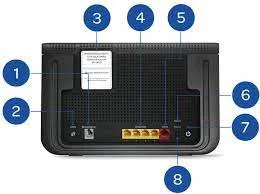Wi-Fi Hub, also known as a router, is a device that connects to your modem and broadcasts a Wi-Fi signal, allowing multiple devices to connect to the internet. This section provides an overview of Wi-Fi hubs and their functions.
Types of Wi-Fi Hubs:
Table Of Contents
There are several types of Wi-Fi hubs available, including:
- Modem Router Combo: A single device that combines a modem and router.
- Dedicated Modem: A device that connects to your internet service provider (ISP) and provides an internet connection.
- Dedicated Router: A device that connects to your modem and broadcasts a Wi-Fi signal.
- Mesh Network Systems: A series of devices that work together to provide a strong Wi-Fi signal throughout a large area.
- Powerline Adaptors: Devices that use your home’s electrical wiring to extend the range of your Wi-Fi signal.

Features of Wi-Fi Hubs:
The features of Wi-Fi hubs vary depending on the type of hub you choose. Some common features include:
- Wi-Fi Speeds: The maximum speed your hub can provide.
- Range: The distance your Wi-Fi signal can reach.
- Number of Ports: The number of LAN ports available for wired devices.
- Parental Controls: Features that allow you to control access to certain websites and restrict internet usage.
- MU-MIMO: A technology that allows multiple devices to connect to the internet at the same time.
- WPA3 Encryption: The latest security protocol for Wi-Fi networks.
- Easy Setup: A user-friendly setup process that makes it easy to get started.
How Wi-Fi Hubs Work:
Wi-Fi hubs work by connecting to your modem and broadcasting a Wi-Fi signal that allows multiple devices to connect to the internet. The hub contains several components, including an antenna, Wi-Fi chip, and processor, that work together to provide a reliable Wi-Fi signal.
Benefits of Wi-Fi Hubs:
There are several benefits to using a Wi-Fi hub, including:
- Improved Wi-Fi Coverage: A Wi-Fi hub can provide a strong signal throughout your home.
- Faster Speeds: Wi-Fi hubs can provide faster internet speeds compared to other options.
- Increased Security: Wi-Fi hubs often include security features,
Wi-Fi Hubs, also known as routers, are devices that connect to your modem and broadcast a Wi-Fi signal, allowing multiple devices to connect to the internet. There are several types of Wi-Fi hubs available, including modem router combo, dedicated modem, dedicated router, mesh network systems, and powerline adaptors.
II. Modem Router Combo:
A modem router combo is a single device that combines a modem and router. The modem connects to your internet service provider (ISP) and provides an internet connection, while the router broadcasts a Wi-Fi signal.
Pros:
Convenient: Only one device to manage and set up.
Cost-effective: Often cheaper than buying separate modem and router.
Cons:
Limited Features: Modem router combos often have limited features compared to dedicated modems and routers.
Limited Upgrade Options: If you want to upgrade your network, you may need to replace the entire device.
III. Dedicated Modem:
A dedicated modem is a device that connects to your internet service provider (ISP) and provides an internet connection. This device does not broadcast a Wi-Fi signal and must be connected to a separate router to provide Wi-Fi coverage.
Pros:
Better Upgradability: Dedicated modems are often easier to upgrade than modem router combos.
Improved Network Performance: Dedicated modems can provide improved network performance compared to modem router combos.
Cons:
More Devices: You need to have both a modem and a router, which can be more devices to manage.
Higher Cost: Dedicated modems and routers can be more expensive than modem router combos.
IV. Dedicated Router:
A dedicated router is a device that connects to your modem and broadcasts a Wi-Fi signal. This device does not connect to your internet service provider (ISP) and must be connected to a separate modem to provide an internet connection.
Pros:
Improved Performance: Dedicated routers often provide better network performance compared to modem router combos.
More Features: Dedicated routers often have more advanced features, such as parental controls and advanced security options.
Cons:
More Devices: You need to have both a modem and a router, which can be more devices to manage.
Higher Cost: Dedicated modems and routers can be more expensive than modem router combos.
V. Mesh Network Systems:
Mesh network systems consist of multiple devices that work together to provide a strong Wi-Fi signal throughout a large area. These systems use a mesh network to
Frequently Asked Questions (FAQs)
What is a Wi-Fi hub?
A Wi-Fi hub, also known as a router, is a device that connects to your modem and broadcasts a Wi-Fi signal, allowing multiple devices to connect to the internet.
What are the different types of Wi-Fi hubs?
The different types of Wi-Fi hubs include modem router combos, dedicated modems, dedicated routers, mesh network systems, and powerline adaptors.
What is a modem router combo?
A modem router combo is a single device that combines a modem and router. The modem connects to your internet service provider (ISP) and provides an internet connection, while the router broadcasts a Wi-Fi signal.
What is a dedicated modem?
A dedicated modem is a device that connects to your internet service provider (ISP) and provides an internet connection. This device does not broadcast a Wi-Fi signal and must be connected to a separate router to provide Wi-Fi coverage.
What is a dedicated router?
A dedicated router is a device that connects to your modem and broadcasts a Wi-Fi signal. This device does not connect to your internet service provider (ISP) and must be connected to a separate modem to provide an internet connection.
What is a mesh network system?
A mesh network system is a set of multiple devices that work together to provide a strong Wi-Fi signal throughout a large area. These systems use a mesh network to route data from one device to another.
What are powerline adaptors?
Powerline adaptors are devices that use your home’s electrical wiring to extend your Wi-Fi signal to areas with poor or no Wi-Fi coverage.
Which type of Wi-Fi hub is best for my home?
The best type of Wi-Fi hub for your home depends on your specific needs and the size and layout of your home. You may want to consider factors such as cost, network performance, and features when making your decision.





Leave a Reply